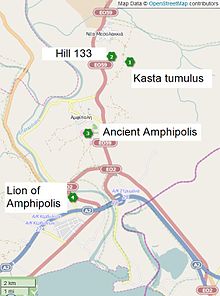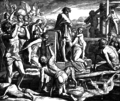Portal:Cities
The Cities Portal

A city is a human settlement of a notable size. The term "city" has different meanings around the world and in some places the settlement can be very small. Even where the term is limited to larger settlements, there is no universally agreed definition of the lower boundary for their size. In a more narrow sense, a city can be defined as a permanent and densely settled place with administratively defined boundaries whose members work primarily on non-agricultural tasks. Cities generally have extensive systems for housing, transportation, sanitation, utilities, land use, production of goods, and communication. Their density facilitates interaction between people, government organizations, and businesses, sometimes benefiting different parties in the process, such as improving the efficiency of goods and service distribution.
Historically, city dwellers have been a small proportion of humanity overall, but following two centuries of unprecedented and rapid urbanization, more than half of the world population now lives in cities, which has had profound consequences for global sustainability. Present-day cities usually form the core of larger metropolitan areas and urban areas—creating numerous commuters traveling toward city centres for employment, entertainment, and education. However, in a world of intensifying globalization, all cities are to varying degrees also connected globally beyond these regions. This increased influence means that cities also have significant influences on global issues, such as sustainable development, climate change, and global health. Because of these major influences on global issues, the international community has prioritized investment in sustainable cities through Sustainable Development Goal 11. Due to the efficiency of transportation and the smaller land consumption, dense cities hold the potential to have a smaller ecological footprint per inhabitant than more sparsely populated areas. Therefore, compact cities are often referred to as a crucial element in fighting climate change. However, this concentration can also have significant negative consequences, such as forming urban heat islands, concentrating pollution, and stressing water supplies and other resources. (Full article...)
Selected city -
Amphipolis (Greek: Αμφίπολη, romanized: Amfipoli; Ancient Greek: Ἀμφίπολις, romanized: Amphipolis) was an important ancient Greek polis (city), and later a Roman city, whose large remains can still be seen. It gave its name to the modern municipality of Amfipoli, in the Serres regional unit of northern Greece.
Amphipolis was originally a colony of ancient Athenians and was the site of the battle between the Spartans and Athenians in 422 BC. It was later the place where Alexander the Great prepared for campaigns leading to his invasion of Asia in 335 BC. Alexander's three finest admirals, Nearchus, Androsthenes and Laomedon, resided in Amphipolis. After Alexander's death, his wife Roxana and their son Alexander IV were imprisoned and murdered there in 311 BC. (Full article...)Did you know -
- ... that at New York City's Apollo Theater, amateurs could be swept off the stage?
- ... that in 2018, 41 out of 45 members of the Malang city council were arrested for corruption?
- ... that Massekhet Amerika by Gerson Rosenzweig satirizes Jewish life in New York in the style of a Talmudic tractate?
- ... that the 1971 Hazelwood massacre was the largest mass murder in the history of "Murder City"?
- ... that Edward Severin Clark was bequeathed the Dakota in New York City when he was 12 years old?
- ... that Sans's boss theme, "Megalovania", was played at the Vatican as part of a circus act during an audience with Pope Francis?
Related portals
Related WikiProjects

Kent is a city in the U.S. state of Ohio and the largest city in Portage County. It is located along the Cuyahoga River in Northeast Ohio on the western edge of the county. The population was 28,215 at the 2020 Census. The city is counted as part of the Akron metropolitan area and the larger Cleveland–Akron–Canton combined statistical area.
Part of the Connecticut Western Reserve, Kent was settled in 1805 and was known for many years as Franklin Mills. Settlers were attracted to the area due to its location along the Cuyahoga River as a place for water-powered mills. Later development came in the 1830s and 1840s as a result of the settlement's position along the route of the Pennsylvania and Ohio Canal. Leading up to the American Civil War, Franklin Mills was noted for its activity in the Underground Railroad. With the decline of the canal and the emergence of the railroad, the town became the home of the Atlantic and Great Western Railroad maintenance shops through the influence of Marvin Kent. In 1864 the town was renamed Kent in honor of and in gratitude for Marvin Kent's efforts. It was incorporated as a village in 1867 and became a city after the 1920 Census. Today Kent is a college town best known as the home of the main campus of Kent State University, founded in 1910, and as the site of the May 4, 1970 Kent State shootings. (Full article...)Selected article -
A direct-administered municipality (直辖市; Zhíxiáshì; 'direct-administered city'; commonly known as municipality) is a city of China that is directly affiliated with the central government and is not placed under any provinces. There are four municipalities in China: Beijing, Tianjin, Shanghai, and Chongqing.
Although being as a city by name, a municipality is more than city in a traditional sense. It is usually composed of a central urban area and a number of much larger surrounding suburban and rural areas. (Full article...)General images -
Topics
List articles
Subcategories
Associated Wikimedia
The following Wikimedia Foundation sister projects provide more on this subject:
-
Commons
Free media repository -
Wikibooks
Free textbooks and manuals -
Wikidata
Free knowledge base -
Wikinews
Free-content news -
Wikiquote
Collection of quotations -
Wikisource
Free-content library -
Wikiversity
Free learning tools -
Wiktionary
Dictionary and thesaurus








































